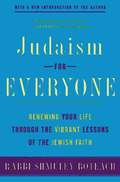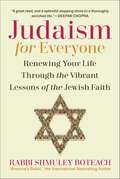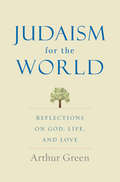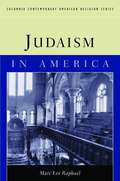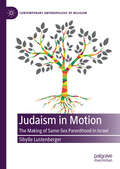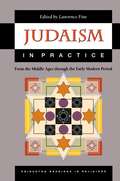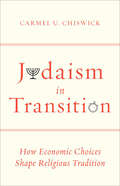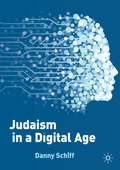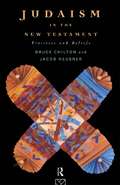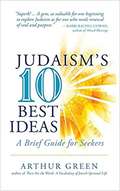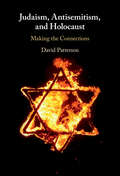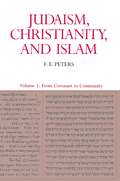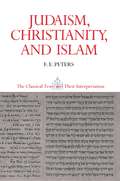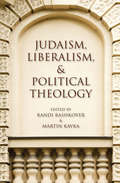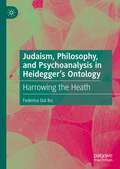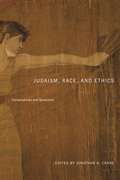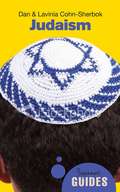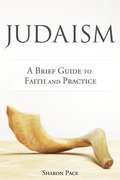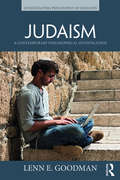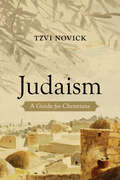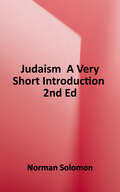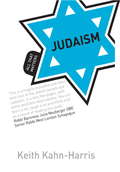- Table View
- List View
Judaism for Everyone: Renewing Your Life Through the Vibrant Lessons of the Jewish Faith
by Rabbi Shmuley BoteachIn Judaism for Everyone Shmuley Boteach imagines a future in which his religion provides "a locus of spirituality for men and women of all faiths. " This sounds like a pretty good future. "In some religions the purpose of life is to perfect oneself," Shmuley begins. "For Judaism the purpose of life is the healing of the world. " So, in the same way that Buddhist and Hindu traditions have spawned global interest in Eastern meditation and yoga, Judaism's broad concern for the holiness of this world may catch on with gentiles. Particular traditions of observance such as the Sabbath, for instance, may help gentiles to heal the alienation and lower the noise level of modern life. Throughout the book, Shmuley describes Judaism in terms that are both startlingly fresh and strangely commonsensical, a balanced perspective that will appeal to many readers.
Judaism for Everyone: Renewing Your Life Through the Vibrant Lessons of the Jewish Faith
by Shmuley BoteachWith the publication of his runaway bestseller Kosher Sex, Rabbi Shmuley Boteach gained instant fame as a sage and savvy commentator on public and private life. Now he turns his outspoken energy and vast erudition to the core teachings of Judaism itself. During his years as Rabbi of Oxford University and founder of the university's Jewish outreach organization, the L'Chaim Society, Boteach began to realize how well-matched the foundational beliefs of Judaism are to the broad human needs of the modern world. Unlike the dualist credo of other religions—in which the material and spiritual are always in conflict—the Jewish faith uniquely represents a spiritual philosophy concerned about life in this world, rather than in the hereafter. In Judaism for Everyone, this most unorthodox of orthodox rabbis explores the Jewish and Biblical origins of civilization's seminal moral ideas and presents Judaism as a program of action for people of all faiths. Boteach's interpretations and commentary are a vibrant celebration of the dynamism that is Judaism. Whether he's peppering his points with stories from his childhood, promoting feminism, decrying boredom, or extolling the virtues of leisure and solitude, Shmuley Boteach never fails to inform, inspire, and surprise. Judaism for Everyone is for anyone who seeks a universal moral creed to maximize human goodness and inner potential.
Judaism for the World: Reflections on God, Life, and Love
by Arthur GreenAn internationally recognized scholar and theologian shares a Jewish mysticism for our times Judaism, one of the world&’s great spiritual traditions, is not addressed to Jews alone. In this masterful book, Arthur Green calls out to seekers of all sorts, offering a universal response to the eternal human questions of who we are, why we exist, where we are going, and how to live. Drawing on over half a century as a Jewish seeker and teacher, he shows us a Judaism that cultivates the life of the spirit, that inspires an inward journey leading precisely toward self-transcendence, to an awareness of the universal Self in whose presence we exist. As a neo-hasidic seeker, he is both devotional and boldly questioning in his understanding of God and tradition. Engaging with the mystical sources, he translates the insights of the Hasidic masters into a new religious language accessible to all those eager to build an inner life and a human society that treasures the divine spark in each person and throughout Creation.
Judaism in America: A Biographical Dictionary and Sourcebook (Columbia Contemporary American Religion Series)
by Marc Lee RaphaelJews have been a religious and cultural presence in America since the colonial era, and the community of Jews in the United States today—some six million people—continues to make a significant contribution to the American religious landscape. Emphasizing developments in American Judaism in the last quarter century among active participants in Jewish worship, this book provides both a look back into the 350-year history of Judaic life and a well-crafted portrait of a multifaceted tradition today. Combining extensive research into synagogue archival records and secondary sources as well as interviews and observations of worship services at more than a hundred Jewish congregations across the country, Raphael's study distinguishes itself as both a history of the Judaic tradition and a witness to the vitality and variety of contemporary American Judaic life. Beginning with a chapter on beliefs, festivals, and life-cycle events, both traditional and non-traditional, and an explanation of the enormous variation in practice, Raphael then explores Jewish history in America, from the arrival of the first Jews to the present, highlighting the emergence and development of the four branches: Orthodox, Conservative, Reconstructionist, and Reform. After documenting the considerable variety among the branches, the book addresses issues of some controversy, notably spirituality, conversion, homosexuality, Jewish education, synagogue architecture, and the relationship to Israel. Raphael turns next to a discussion of eight American Jews whose thoughts and/or activities made a huge impact on American Judaism. The final chapter focuses on the return to tradition in every branch of Judaism and examines prospects for the future.
Judaism in Motion: The Making of Same-Sex Parenthood in Israel (Contemporary Anthropology of Religion)
by Sibylle LustenbergerIn Israel, where the Orthodox rabbinate wields historically sanctioned influence over the legal definitions of marriage and parenthood, same-sex parenthood raises important questions such as what constitutes belonging to the national collective, who has the authority to define the norms of reproduction, and where the boundaries of Orthodox Judaism begin and end. Judaism in Motion addresses these questions from a transgenerational perspective that pays heed to how religiously informed rules, norms, and practices of transferring material properties, names, and societal belonging are adopted and transformed. It presents a detailed ethnographic account of the dynamic interaction between kinship, religion, and the state that complicates the commonly held assumption that places same-sex parenthood in a radically secular sphere that stands in stark opposition to Orthodox Judaism. Taking same-sex parenthood as a prism through which society at large is reflected, this volume further explores how transformations of societal structures take place, and what flexibility and leeway exist in organized religions.
Judaism in Practice: From the Middle Ages through the Early Modern Period (Princeton Readings in Religions #11)
by Lawrence FineThis collection of original materials provides a sweeping view of medieval and early modern Jewish ritual and religious practice. Including such diverse texts as ritual manuals, legal codes, mystical books, autobiographical writings, folk literature, and liturgical poetry, it testifies to the enormous variety of practices that characterized Judaism in the twelve hundred years between 600 and 1800 C.E. Its focus on religious practice and experience--how Judaism was actually lived by people from day to day--makes this anthology unique among the few sourcebooks available. The volume encompasses the broad scope and complex texture of Jewish religious practice, taking into account many aspects of Jewish culture that have hitherto been relatively neglected: the religious life of ordinary people, the role and status of women, art and aesthetics, and marginalized as well as remote Jewish communities. It introduces such remarkable personalities as Moses Maimonides, Leon Modena, and Gluckel of Hameln, and presents extraordinary texts on festival practice, Torah study, mystical communities, meditation, exorcism, the practice of charity, and folk rites marking birth and death. Representing state-of-the-art scholarship by distinguished academics from around the world, the volume includes many materials never before translated into English. Each text is preceded by an accessible introduction, making this book suitable for college and university students as well as a general audience. Whether read as a deliberate course of study or dipped into selectively for a glimpse into fascinating Jewish lives and places, Judaism in Practice holds rich rewards for any reader.
Judaism in Transition: How Economic Choices Shape Religious Tradition
by Carmel U. ChiswickAt the core of Judaism stands a body of traditions that have remained consistent over millennia. Yet, the practice of these rituals has varied widely across historical and cultural contexts. In Judaism in Transition, Carmel U. Chiswick draws on her Jewish upbringing, her journey as a Jewish parent, and her perspective as an economist to consider how incentives affect the ways that mainstream American Jews have navigated and continue to manage the conflicting demands of everyday life and religious observance. Arguing that economics is a blind spot in our understanding of religion, Chiswick blends her personal experiences with economic analysis to illustrate the cost of Jewish participation—financially and, more importantly, in terms of time and effort. The history of American Jews is almost always told as a success story in the secular world. Chiswick recasts this story as one of innovation in order to maintain a distinctive Jewish culture while keeping pace with the steady march of American life. She shows how tradeoffs, often made on an individual and deeply personal level, produce the brand of Judaism which predominates in America today. Along the way, Chiswick explores salient and controversial topics—from intermarriage to immigration and from egalitarianism to connections with Israel. At once a portrait of American Jewish culture and a work that outlines how economic decisions affect religion, Judaism in Transition shows how changes in our economic environment will affect the Jewish community for decades to come.
Judaism in a Digital Age: An Ancient Tradition Confronts a Transformative Era
by Danny SchiffWhat is the next chapter in Judaism’s story, the next step in its journey? The dramatic changes of recent decades invite us to explore what role Judaism is to play in this new era. As the digital future becomes the present, Danny Schiff makes the case that the period known as “modernity” has come to an end. Noting the declining strength of Conservative and Reform Judaism, the largest US Jewish movements of modernity, he argues for new iterations of Judaism to arise in response to the myriad of weighty questions that now confront us about what it means to be human. Here is an account of the digital age through a Jewish lens, in which Schiff examines Jewish teachings and traditions, exploring what moral insight they might have to offer in this period of great flux. He marshals the thought of well-known futurists such as Ray Kurzweil and Yuval Noah Harari to forecast the exponentially larger shifts in the human condition that lie ahead, and proposes that a countercultural Judaism could have renewed relevance in addressing some of the pressing issues that confront humanity in the twenty-first century.
Judaism in the New Testament: Practices and Beliefs
by Jacob Neusner Bruce ChiltonJudaism in the New Testament explains how the writings of the early church emerged from communities which defined themselves in Judaic terms even as they professed faith in Christ. These two extremely distinguished scholars introduce readers to the plurality of Judaisms of the period. They show, by examining a variety of texts, how the major figures of the New Testament reflect distinctly Judaic practices and beliefs.This important study shows how the early movement centred on Jesus is best seen as `Christian Judaism'. Only with the Epistle to the Hebrews did the profile of a new and distinct Christian religion emerge.
Judaism's Ten Best Ideas: A Brief Guide for Seekers
by Arthur GreenIn an age of fluid identity, many people are honestly asking the question "Why be Jewish?" What in this religious and ethnic legacy is worth preserving? Does Judaism have something unique to offer a contemporary seeker free to choose a way of life and a system of values? <p><p> Here is the answer of a leading spiritual teacher who has faced these questions in conversation with generations of students. With warmth, humor, personal and rabbinic stories and down-to-earth explanations, Arthur Green presents the ideas in Judaism that kept him loyal to the tradition passed on to him. The result is an enticing look into timeless Jewish wisdom that will encourage you to explore further and search out the riches of Judaism for yourself.
Judaism, Antisemitism, and Holocaust: Making the Connections
by David PattersonIn this book, David Patterson offers original insights into the dynamics that underlie the phenomenon of endemic antisemitism, arguing that in all its manifestations, antisemitism is fundamentally anti-Judaism. Structured in a unique matrix of chapters that are linked historically and theoretically, his book elucidates the interconnections that tie antisemitism with the Holocaust, as well as the Judaism that the Nazis sought to obliterate from the world. As Patterson demonstrates this is an ongoing effort and is the basis of today's antisemitism. Spelling out the historical, theological, and philosophical viewpoints that led to the Holocaust and that are with us even now, he offers insights into the basis of the hatred of Jews that permeates much of today's world. Patterson here addresses the 'big questions' that define our humanity. His volume is written for those who wish to have a deeper understanding of both the history and the current manifestations of Antisemitism.
Judaism, Christianity, and Islam: From Convenant to Community
by F. E. PetersInvoking a concept as simple as it is brilliant, F. E. Peters has taken the basic texts of the three related--and competitive--religious systems we call Judaism, Christianity, and Islam and has juxtaposed them in a topical and parallel arrangement according to the issues that most concerned all these "children of Abraham." Through these extensive passages, and the author's skillful connective commentary, the three traditions are shown with their similarities sometimes startlingly underlined and their well-known differences now more profoundly exposed. What emerges from this unique and ambitious work is a panorama of belief, practice, and sensibility that will broaden our understanding of our religious and political roots in a past that is, by these communities' definition, still the present. The hardcover edition of the work is bound in one volume, and in the paperback version the identical material is broken down into three smaller but self-contained books. The first, "From Covenant to Community," includes texts and comments on the covenant and early history of the Chosen People and their post-Exilic reconstruction; the career and message of the Messiah Jesus and the Prophet Muhammad; the concept of holiness and of a "kingdom of priests"; and, finally, the notions of church and state and the state as a church. Throughout the work we hear an amazing variety of voices, some familiar, some not, all of them central to the primary and secondary canons of their own tradition: alongside the Scriptural voice of God are the words of theologians, priests, visionaries, lawyers, rulers and the ruled. The work ends, as does the same author's now classic Children of Abraham, in what Peters calls the "classical period," that is, before the great movements of modernism and reform that were to transform Judaism, Christianity, and Islam.
Judaism, Christianity, and Islam: The Word and the Law and the People of God
by F. E. PetersInvoking a concept as simple as it is brilliant, F. E. Peters has taken the basic texts of the three related--and competitive--religious systems we call Judaism, Christianity, and Islam and has juxtaposed them in a topical and parallel arrangement according to the issues that most concerned all these "children of Abraham." Through these extensive passages, and the author's skillful connective commentary, the three traditions are shown with their similarities sometimes startlingly underlined and their well-known differences now more profoundly exposed. What emerges from this unique and ambitious work is a panorama of belief, practice, and sensibility that will broaden our understanding of our religious and political roots in a past that is, by these communities' definition, still the present. The hardcover edition of the work is bound in one volume, and in the paperback version the identical material is broken down into three smaller but self-contained books. The second, "The Word and the Law and the People of God," discusses the scriptures of the three faiths in various contexts, exegetical and legal. Throughout the work we hear an amazing variety of voices, some familiar, some not, all of them central to the primary and secondary canons of their own tradition: alongside the Scriptural voice of God are the words of theologians, priests, visionaries, lawyers, rulers and the ruled. The work ends, as does the same author's now classic Children of Abraham, in what Peters calls the "classical period," that is, before the great movements of modernism and reform that were to transform Judaism, Christianity, and Islam.
Judaism, Liberalism, & Political Theology (Encounters: Explorations in Folklore and Ethnomusicology)
by Daniel Weidner Dana Hollander Zachary Braiterman Eric Jacobson Robert Erlewine Sarah Hammerschlag Bruce Rosenstock Brian Britt Jerome E. Copulsky Gregory Kaplan Daniel Brandes Oona EisenstadtThese essays propose &“a new and richly detailed engagement between Judaism and the political&” (Jewish Book World).Judaism, Liberalism, and Political Theology provides the first broad encounter between modern Jewish thought and recent developments in political theology, arguing in opposition to impetuous associations of Judaism and liberalism and charges that Judaism cannot engender a universal political order. The vexed status of liberalism in Jewish thought and Judaism in political theology is interrogated with recourse to thinking from across the Continental tradition. &“This collection of essays, which examines political theology from the distinct perspective of Jewish philosophy, could not be timelier or more useful for scholars and students navigating what is often viewed as very dense and difficult material.&”—Claire Elise Katz, Texas A&M University
Judaism, Philosophy, and Psychoanalysis in Heidegger’s Ontology: Harrowing the Heath
by Federico Dal BoIn this book, Federico Dal Bo analyzes the question of Heidegger’s anti-Semitism from a deconstructive point of view, appealing not only to philosophy but also to psychoanalysis, gender studies, and critical studies. Deconstruction famously discourages simplistic oppositions whilst encouraging a more careful analysis of cultural and philosophical complexities of a semantic field. In the present case, a deconstructive analysis of Heidegger’s anti-Semitism rejects both a stern condemnation of his oeuvre and a simplistic acquittal from this infamous accusation. It rather suggests that the question of his anti-Semitism shall be examined from the broader perspective—from the end of metaphysics.
Judaism, Race, and Ethics: Conversations and Questions (Dimyonot)
by Jonathan K. CraneRecent political and social developments in the United States reveal a deep misunderstanding of race and religion. From the highest echelons of power to the most obscure corners of society, color and conviction are continually twisted, often deliberately for nefarious reasons, or misconstrued to stymie meaningful conversation. This timely book wrestles with the contentious, dynamic, and ethically complicated relationship between race and religion through the lens of Judaism. Featuring essays by lifelong participants in discussions about race, religion, and society— including Susannah Heschel, Sander L. Gilman, and George Yancy—this vibrant book aims to generate a compelling conversation vitally relevant to both the academy and the community. Starting from the premise that understanding prejudice and oppression requires multifaceted critical reflection and a willingness to acknowledge one’s own bias, the contributors to this volume present surprising arguments that disentangle fictions, factions, and facts. The topics they explore include the role of Jews and Jewish ethics in the civil rights movement, race and the construction of American Jewish identity, rituals of commemoration celebrating Jewish and black American resilience, the “Yiddish gaze” on lynchings of black bodies, and the portrayal of racism as a mental illness from nineteenth-century Vienna to twenty-first-century Charlottesville. Each essay is linked to a classic Jewish source and accompanied by guiding questions that help the reader identify salient themes connecting ancient and contemporary concerns.In addition to the editor, the contributors include Sander L. Gilman, Annalise E. Glauz-Todrank, Aaron S. Gross, Susannah Heschel, Sarah Imhoff, Willa M. Johnson, Judith W. Kay, Jessica Kirzane, Nichole Renée Phillips, and George Yancy.
Judaism, Race, and Ethics: Conversations and Questions (Dimyonot: Jews and the Cultural Imagination #8)
by Jonathan K. CraneRecent political and social developments in the United States reveal a deep misunderstanding of race and religion. From the highest echelons of power to the most obscure corners of society, color and conviction are continually twisted, often deliberately for nefarious reasons, or misconstrued to stymie meaningful conversation. This timely book wrestles with the contentious, dynamic, and ethically complicated relationship between race and religion through the lens of Judaism. Featuring essays by lifelong participants in discussions about race, religion, and society— including Susannah Heschel, Sander L. Gilman, and George Yancy—this vibrant book aims to generate a compelling conversation vitally relevant to both the academy and the community. Starting from the premise that understanding prejudice and oppression requires multifaceted critical reflection and a willingness to acknowledge one’s own bias, the contributors to this volume present surprising arguments that disentangle fictions, factions, and facts. The topics they explore include the role of Jews and Jewish ethics in the civil rights movement, race and the construction of American Jewish identity, rituals of commemoration celebrating Jewish and black American resilience, the "Yiddish gaze" on lynchings of black bodies, and the portrayal of racism as a mental illness from nineteenth-century Vienna to twenty-first-century Charlottesville. Each essay is linked to a classic Jewish source and accompanied by guiding questions that help the reader identify salient themes connecting ancient and contemporary concerns.In addition to the editor, the contributors include Sander L. Gilman, Annalise E. Glauz-Todrank, Aaron S. Gross, Susannah Heschel, Sarah Imhoff, Willa M. Johnson, Judith W. Kay, Jessica Kirzane, Nichole Renée Phillips, and George Yancy.
Judaism: A Beginner's Guide (Beginner's Guides)
by Lavinia Cohn-Sherbok Dan Cohn-SherbokIn this clear and authoratative guide, Lavinia and Dan Cohn-Sherbok concisely examine the Jewish faith and its practices and explore what it means to be a Jew today. From the nature of God to the divisions within Judaism and from worship to customs, Judaism: A Beginner's Guide covers all the topics essential to an informed understanding of this highly influential 3000-year old faith and its traditions.
Judaism: A Brief Guide To Faith And Practice
by Sharon Pace"Judaism: A Brief Guide to Faith and Practice" is a sensitive and comprehensive introduction to Judaism. What is it like to be born into the Jewish community? How does belief in the One God and a universal morality shape the way in which Jews see the world? How does one find meaning in life and the courage to endure suffering? How does one mark joy and forge community ties? By examining these details of Jewish life, readers can see how Jews have defined themselves and their relationship to the Almighty, how they have identified tools for a righteous and purposeful existence, and how they hope to make the world a dwelling place for God.
Judaism: A Contemporary Philosophical Investigation (Investigating Philosophy of Religion #8)
by Lenn E. GoodmanJudaism, as a religion and a way of life, has guided millions of lives and profoundly influenced its younger sisters, Christianity and Islam, as well as contributing major themes and norms to the liberal and humanistic traditions of the West. Not all Jews are religious, and not all of Judaism is philosophical; but at its core Judaism rests on a complex of values and ideas that address the abiding concerns of philosophy and perennial questions about the meaning and purpose of life, the nature of the universe, the roots and fruits of human responsibility, the character of justice, the worth of nature, and the dignity of persons. Judaism: A Contemporary Philosophical Investigation examines some of the central questions that such ideas raise, drawing on the ancient and more recent sources of Jewish thought, as viewed from a contemporary philosophical standpoint. This book is an ideal introduction for students of religion and philosophy who want to gain an understanding of the key themes and values of Judaism.
Judaism: A Guide for Christians
by Tzvi NovickAn innovative introduction to Judaism and the Jewish people for Christian readers In this fascinating and highly original book, Tzvi Novick introduces readers to foundational features of Jewish theology by explaining its similarities to and differences from Christian theology. Novick also leads readers through the major milestones of Christian teaching about Jews and Judaism, devoting particular attention to contemporary teachings and unsettled questions. Each chapter includes helpful recommendations for further reading as well as detailed discussion questions, making the book an outstanding resource for teaching. In the introduction, Novick eloquently conveys why a book like this is needed: &“If Christians take themselves to have, in some sense, a common destiny with the Jewish people, then they should understand who these fellow travelers are. . . . If the Church is committed to the notion that God&’s covenant with the Jewish people endures, then Jewish responses to God can in principle be an important source of theological insight for Christians themselves.&” This is a beautifully written book that contributes richly to interfaith dialogue and understanding.
Judaism: A Very Short Introduction
by Norman SolomonNorman Solomon's succinct book is an ideal introduction to Judaism as a religion and way of life. In addition to surveying the nature and development of Judaism, this Very Short Introduction outlines the basics of practical Judaism -- its festivals, prayers, customs, and various sects. Modern concerns and debates of the Jewish people are also addressed, such as the impact of the Holocaust, the establishment of the State of Israel, the status of women, and medical and commercial ethics.
Judaism: A Very Short Introduction
by Norman SolomonNorman Solomon's succinct book is an ideal introduction to Judaism as a religion and way of life. In addition to surveying the nature and development of Judaism, this Very Short Introduction outlines the basics of practical Judaism -- its festivals, prayers, customs, and various sects. Modern concerns and debates of the Jewish people are also addressed, such as the impact of the Holocaust, the establishment of the State of Israel, the status of women, and medical and commercial ethics.
Judaism: All That Matters
by Keith Kahn-HarrisFor a group of people so limited in number, the Jewish community has had a huge impact on both global events and local politics. In this vibrant new look at Judaism, sociologist and cultural critic Keith Kahn-Harris provides a remarkably sharp insight into this history, and particularly the diverse Jewish communities (and diverse ideas of Jewishness) that exist today.
Judaism: All That Matters (All That Matters)
by Keith Kahn-HarrisFor a group of people so limited in number, the Jewish community has had a huge impact on both global events and local politics. In this vibrant new look at Judaism, sociologist and cultural critic Keith Kahn-Harris provides a remarkably sharp insight into this history, and particularly the diverse Jewish communities (and diverse ideas of Jewishness) that exist today.
